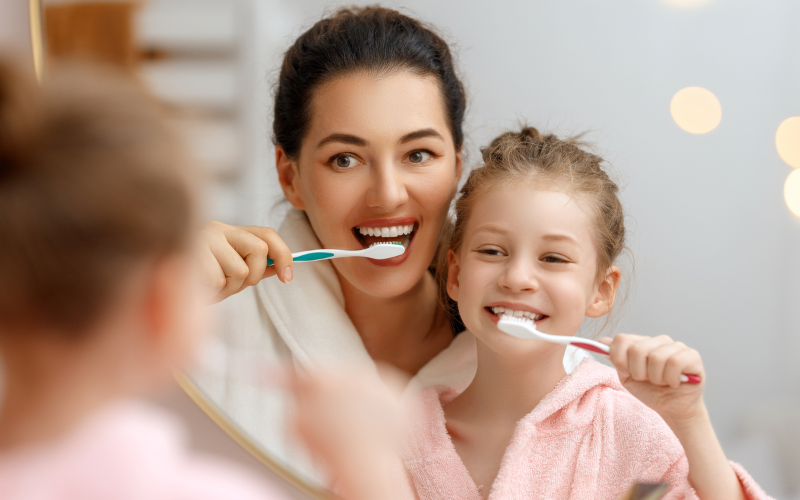Teaching your child good oral hygiene habits is one of the best gifts you can give them. Starting early can lay the foundation for a lifetime of healthy smiles and prevent future dental problems.
Kids pick up habits from those around them, so setting a positive example at home is essential.
Making brushing and flossing fun doesn’t have to be a challenge. With a little creativity and consistency, you can turn daily routines into enjoyable activities your child looks forward to.
In this blog, we’ll share practical tips that will help you teach your child how to take care of their teeth while building healthy habits that last. Let’s dive in!
Start Early: Teaching Kids Healthy Habits from the Beginning
Starting oral hygiene habits early sets your child up for success. The sooner you introduce these routines, the better they will understand the importance of keeping their teeth clean. Even before your child gets their first tooth, you can begin gently wiping their gums with a soft cloth.
- Start brushing as soon as the first tooth appears (usually around 6 months).
- Use a small, soft toothbrush with water to clean their teeth.
- Explain that baby teeth are important for eating, speaking, and holding space for permanent teeth.
- By brushing early, you create a positive routine that will stick with your child for years.
These early habits teach your child the importance of dental care and build a foundation for long-term oral health.
Make Brushing Fun: Turning Routine into Play
Brushing doesn’t have to feel like a chore—it can be an exciting part of the day! Children love routines that feel playful, and making brushing fun will keep them engaged. Try turning oral hygiene into an enjoyable experience that they look forward to every day.
- Sing brushing songs or use apps that make brushing a fun game.
- Let them pick out their toothbrushes. Colorful, fun designs make brushing more exciting.
- Use a timer or a song that lasts two minutes to make sure they brush long enough.
- Offer small rewards like stickers or extra playtime when they brush without fuss.
By making brushing fun and part of an enjoyable routine, you’ll help your child view dental care as an exciting, everyday activity rather than a task. Encouragement and praise go a long way, too! visits to the dentist in Houston will also reinforce good habits and keep their smile health.
Choosing the Right Toothbrush and Toothpaste for Kids
Selecting the right toothbrush and toothpaste makes a significant difference in encouraging your child to brush regularly. The right tools can make brushing more effective and enjoyable.
- Choose a toothbrush that fits your child’s mouth, with soft bristles for gentle brushing.
- Look for a toothbrush with a small head for easy maneuverability.
- Pick a fluoride toothpaste with a kid-friendly flavor (think bubblegum or strawberry).
- Avoid adult toothpaste, as it can be too harsh for little mouths.
- Ensure that your child uses a pea-sized amount of toothpaste and supervise them until they’re old enough to brush on their own.
These simple choices help foster good oral hygiene habits and make brushing an easier and more enjoyable task.
Lead by Example: Be a Role Model for Good Oral Hygiene
Kids learn by watching their parents, so be a positive role model when it comes to oral hygiene. Set the tone by demonstrating your own healthy habits.
- Brush and floss properly together as a family. This shows that oral care is part of everyday life.
- Talk openly about why brushing and flossing are important, reinforcing good habits.
- Celebrate the progress your child makes, even if it’s just getting through the process without complaints.
- Encourage your child by praising them when they take initiative in brushing or flossing.
When you make oral hygiene a priority, your child will naturally follow your lead. Positive reinforcement and a consistent routine will set them on the path to healthy teeth and gums.
Teaching the Importance of Flossing and Mouthwash
Flossing is just as important as brushing, but many kids (and adults!) overlook it. Teaching your child to floss early ensures they understand the importance of cleaning between their teeth.
- Start flossing when your child has two teeth that touch. Gently guide them on how to floss without hurting their gums.
- Make flossing fun by letting them choose flossers with fun colors or characters.
- Explain how flossing removes food particles and plaque that a toothbrush can’t reach.
- Introduce mouthwash once your child is old enough (typically around age 6). Use alcohol-free mouthwash designed for kids to help prevent cavities and keep breath fresh.
By teaching your child these habits, you’re ensuring they have the tools to maintain a healthy mouth throughout their life.
Regular Dental Check-ups: Why They Matter?
Routine dental visits are essential for maintaining your child’s oral health. These check-ups help monitor their teeth and gums, while also reinforcing the importance of good hygiene.
- Schedule dental visits every six months, starting as soon as your child gets their first tooth.
- Regular check-ups allow the dentist to spot any potential issues early on.
- Dentists can teach your child proper brushing techniques and answer their questions in a fun, age-appropriate way.
- To make visits less intimidating, prepare your child by talking positively about the dentist ahead of time.
Creating good oral hygiene habits early on sets your child up for a lifetime of healthy teeth and gums. By making brushing fun, leading by example, and maintaining regular check-ups, you’ll instil habits that will last a lifetime. Start today, and watch your child grow with confidence in their bright, healthy smile!

